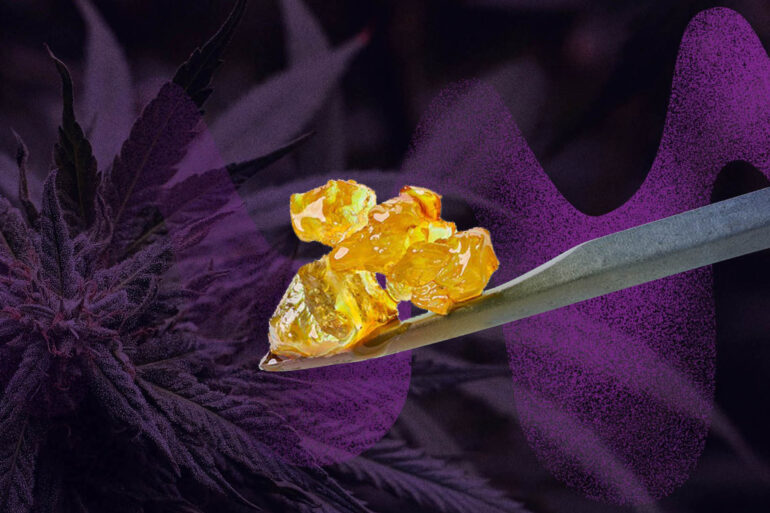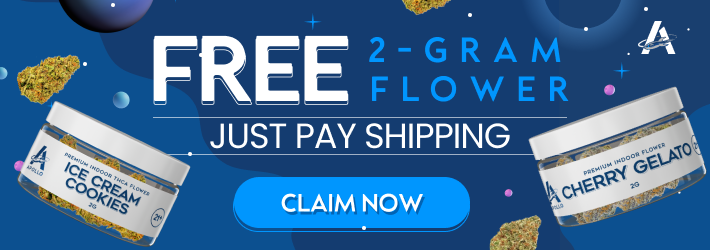Key Takeaways:
- In cannabis plants, THCA serves as the intermediary between CBGA and THC, sharing properties with both.
- THCA can be beneficial for a variety of inflammatory-related conditions, neurodegenerative diseases, seizures, and more.
- THCA is non-intoxicating. However, when exposed to heat through smoking, baking, or vaporizing, THCA undergoes a process known as decarboxylation (“decarbing”), transforming into THC and producing psychoactive effects.
- Based on limited evidence, THCA’s side effects include drowsiness, decreased appetite, and fatigue.
How Was THCA Discovered?
The world first learned of tetrahydrocannabinolic acid (THCA) in a 1965 paper, and Dr. Mechoulam confirmed the existence of its two forms in 1969.
THCA is sometimes written as THCA-A, its main form, but there’s also THCA-B. The origin and significance of THCA-B are entirely unknown, however, decarboxylation of either results in psychoactive THC.
As hinted in the name by the letter “A”, THCA has an acidic group on it. The “acid” part may sound intimidating but is not something to fear, it is only a weak carbohydrate that is lost as carbon dioxide when heated, smoked, or vaped.
Around 90% of a plant’s THC comes from THCA, which is naturally made and stored in the trichomes.
THCA vs. THC: Key Differences
- THCA is the non-intoxicating predecessor of THC
- THCA becomes THC when exposed to heat, light, UV rays, and long storage time
- 100% of THCA is converted into THC at 220°C / 420°F within 40 seconds of vaporization
- If smoked, total conversion also occurs but only 30% of the new THC remains
- Other than psychoactivity, THC and THCA share many therapeutic potential uses
- THCA may be a more potent antiemetic than THC
- THCA can be employed advantageously if patients cannot tolerate THC, or live in a THC-restricted state
RELATED: What’s the Difference Between THCA and THC?
THCA vs. CBD: Key Differences
- THCA and CBD share similar antiinflammatory and anticonvulsant properties
- THCA is to THC as CBDA is to CBD; both are decarboxylated
- Preclinical research suggests THCA may be better than CBD for IBD, and also could be an effective add-on to CBD for seizures
Benefits and Effects
The potential benefits of THCA are based on its abilities as a potent anti-inflammatory agent.
However, this research is almost entirely in the preclinical stage meaning they are promising but not yet proven in humans.
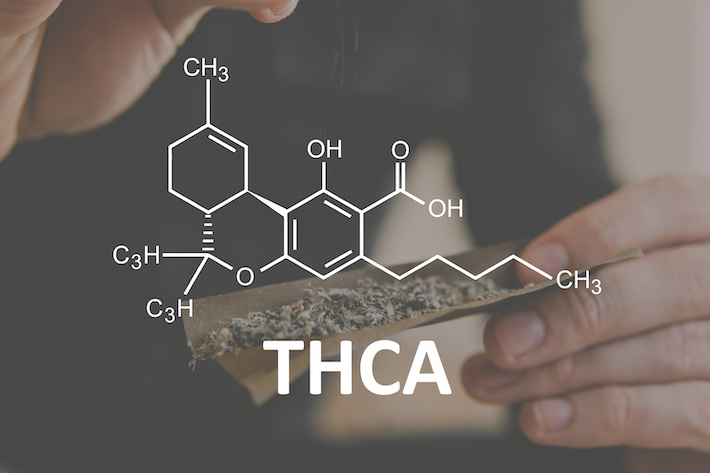
By targeting various receptors mainly outside the traditional endocannabinoid system, THCA may play a therapeutic role in:
- General inflammation and inflammatory disorders
- Nausea and vomiting; perhaps more potent than delta-9 THC in mice
- Obesity: less metabolic disease, lower inflammation, improve blood sugar, prevent liver fibrosis
- Seizures
- Possibly at lower doses than CBD, shown in mice
- Small, early data confounded by THC and α-linalool
- However, THCA did not improve seizure frequency in children
- IBD: THCA may fight inflammation better than CBD in colon cells
- Cancer: Synergistic with CBGA against precancerous colon polyps and leukemia cancer cells
- Neurodegenerative diseases
- Neuroprotective in mice with Huntington’s disease
- Associated with improvements in motor function, dystonia, and dopamine neuron viability – but could also be from THC
- However, THCA has poor brain penetration
What Are the Side Effects of THCA?
Since there aren’t any clinical studies focused on the effects of THCA, there is much to be learned about its side effects.
It is difficult to anticipate the exact side effects from THCA, but in general, the most common side effects reported in a small 2017 pediatric study using CBD and THCA preparations are similar to most hemp products:
- Drowsiness and sleepiness
- Decreased appetite
- Fatigue
Opposite effects like increased alertness were also reported. Few people have reported feeling high from THCA which most likely resulted due to decarboxylation or THC contamination.
Dosage
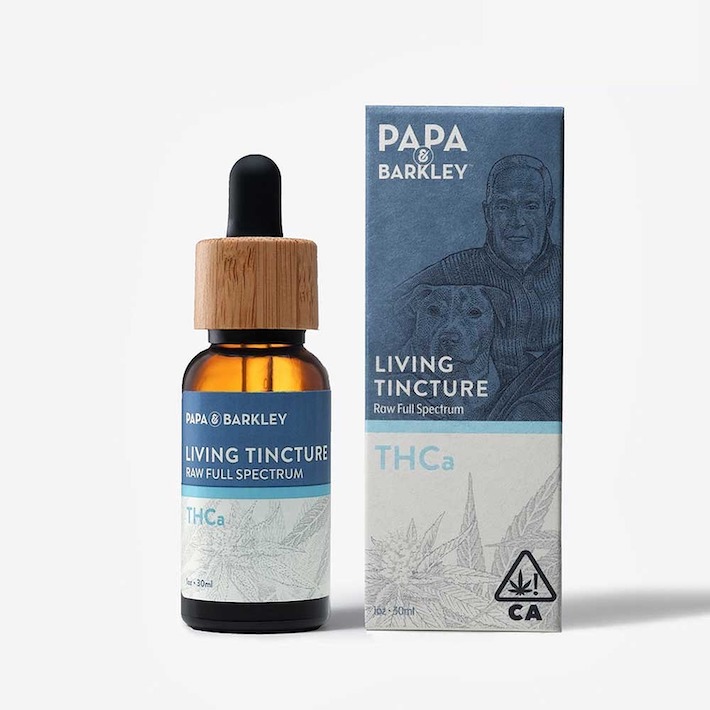
Without clear guidelines, dosing THCA should be more like dosing CBD and other non-intoxicating cannabinoids. An average starting point for a beginner is 5-10 mg THCA per oral dose, up to twice daily depending on your goals.
If inhaled, try 2-3 puffs and wait 1-2 hours before taking more since the THCA will become psychoactive THC when vaped. As a cannabis coach, I help patients optimize regimens from there based on their specific needs.
Keep in mind the effects and timing you would like to have before you experiment. Journaling is best to keep track of doses, dates, routes, brands, and effects over time. Always consult your provider for any health concerns first.
Will THCA Get You High?
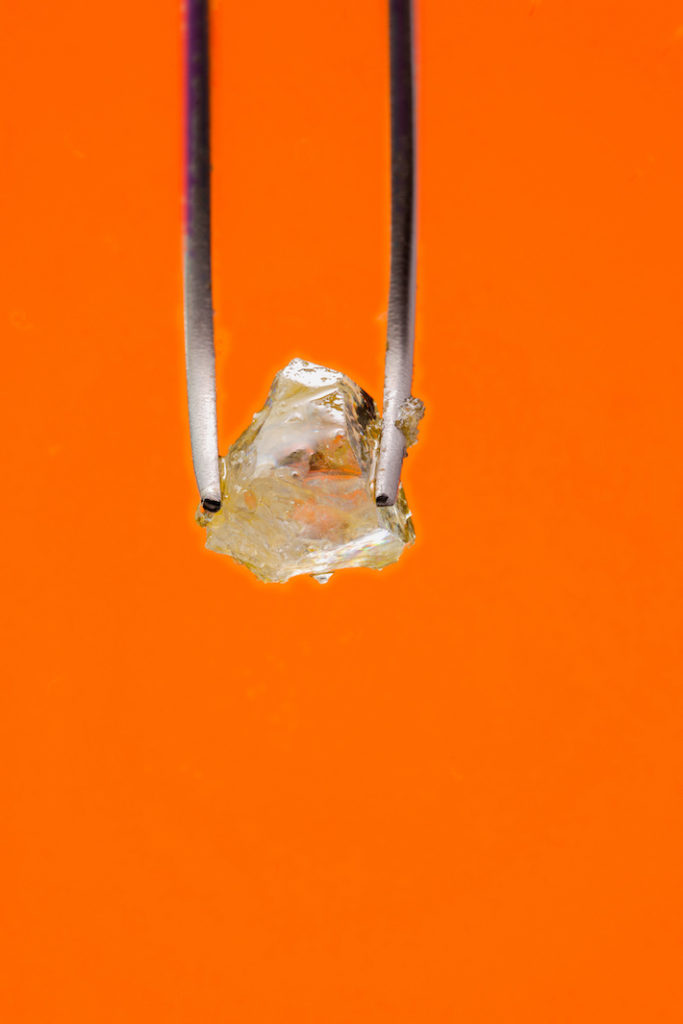
When THCA is taken at room temperature via tincture, oral, edible, topical, or suppository form, you may get relief similar to THC consumption without getting high. This is because the body does not internally “decarb” THCA into THC.
However, consumers can still get high from THCA products if enough THC is generated after harvesting by the manufacturer or upon heated consumption, deliberately or not. Smoking, dabbing, or baking THCA flower, crystals (“diamonds”), and vapes are immediately going to cause a high from the heat involved in their consumption.
Drug Tests
THCA products can cause a positive test result for cannabinoids on drug screens.
In fact, THCA can be measured in body fluids within 8 hours of use to determine recent herbal vs pharmaceutical (synthetic) THC consumption.
Conclusion
THCA is a new contender and a great non-psychoactive alternative to THC. However, scientific data is weak and consumers should be aware of the psychoactive and potentially legal consequences of easily converting THCA into THC.
References
- Walsh, K. B., McKinney, A. E., & Holmes, A. E. (2021). Minor Cannabinoids: Biosynthesis, Molecular Pharmacology and Potential Therapeutic Uses. Frontiers in Pharmacology, 12, 777804. https://doi.org/10.3389/fphar.2021.777804
- Sulak, D., Saneto, R., & Goldstein, B. (2017). The current status of artisanal cannabis for the treatment of epilepsy in the United States. Epilepsy & Behavior: E&B, 70(Pt B), 328–333. https://doi.org/10.1016/j.yebeh.2016.12.032
- Filer, C. N. (2022). Acidic Cannabinoid Decarboxylation. Cannabis and Cannabinoid Research, 7(3), 262–273. https://doi.org/10.1089/can.2021.0072
- Moreno-Sanz, G. (2016). Can You Pass the Acid Test? Critical Review and Novel Therapeutic Perspectives of Δ9-Tetrahydrocannabinolic Acid A. Cannabis and Cannabinoid Research, 1(1), 124–130. https://doi.org/10.1089/can.2016.0008
- Kight, R. THCa Flower- The Next Big Thing in Hempland? | Kight on Cannabis. (2022). Retrieved August 28, 2023, from https://cannabusiness.law/thca-flower-the-next-big-thing-in-hempland/
- Eyal, A. M., Berneman Zeitouni, D., Tal, D., Schlesinger, D., Davidson, E. M., & Raz, N. (2023). Vapor Pressure, Vaping, and Corrections to Misconceptions Related to Medical Cannabis’ Active Pharmaceutical Ingredients’ Physical Properties and Compositions. Cannabis and Cannabinoid Research, 8(3), 414–425. https://doi.org/10.1089/can.2021.0173
- Nallathambi, R., Mazuz, M., Ion, A., Selvaraj, G., Weininger, S., Fridlender, M., Nasser, A., Sagee, O., Kumari, P., Nemichenizer, D., Mendelovitz, M., Firstein, N., Hanin, O., Konikoff, F., Kapulnik, Y., Naftali, T., & Koltai, H. (2017). Anti-Inflammatory Activity in Colon Models Is Derived from Δ9-Tetrahydrocannabinolic Acid That Interacts with Additional Compounds in Cannabis Extracts. Cannabis and Cannabinoid Research, 2(1), 167–182. https://doi.org/10.1089/can.2017.0027
